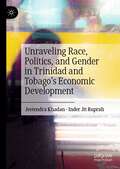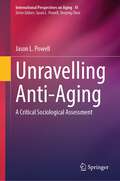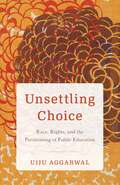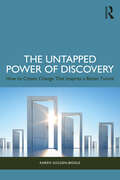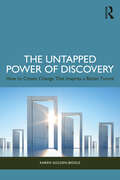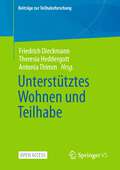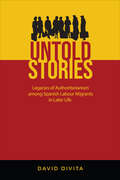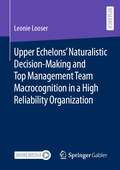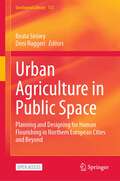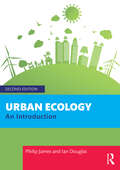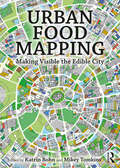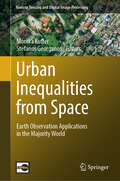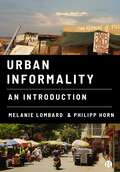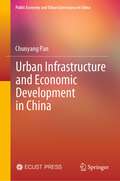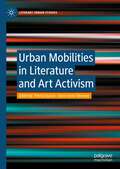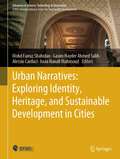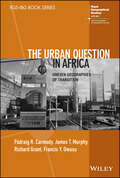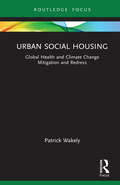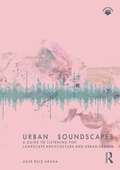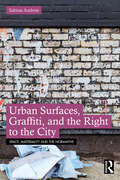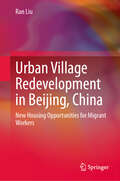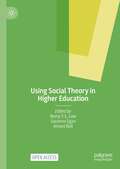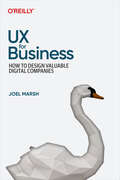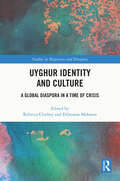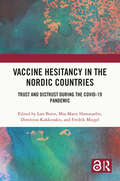- Table View
- List View
Unraveling Race, Politics, and Gender in Trinidad and Tobago’s Economic Development
by Jeetendra Khadan Inder Jit RuprahThis book delves into Trinidad and Tobago's development with a fresh lens. It stands as the inaugural empirical exploration of the country's unique attributes, including its diversity, ex-British colony status, small-state categorization by population size, and its dependence on hydrocarbons.Through meticulous empirical analysis, this book scrutinizes the nation's economic, social, and political outcomes within the context of these four distinctive parameters, offering fresh insights into the country's development trajectory.What sets this book apart is its unwavering commitment to a data-driven approach. Drawing upon a vast array of databases from both international and national sources, it provides a thorough examination of development indicators, household welfare metrics, firm-level performance, and individual perspectives on a wide range of political, economic, and social issues.For scholars, policymakers, and anyone with an interest in understanding how unique contextual factors shape a Trinidad and Tobago's development, this book offers an enlightening and data-rich perspective on the nation's journey towards progress and prosperity.
Unravelling Anti-Aging: A Critical Sociological Assessment (International Perspectives on Aging #41)
by Jason L. PowellIn a society where youthfulness and vitality are highly valued, the quest for anti-aging solutions has become increasingly popularized in bio-medical gerontology. However, navigating the vast sea of information, products, and treatments can be overwhelming; there is limited academic rigor and theoretic critique from sociological perspectives. This book aims to demystify the concept of anti-aging and presents critical social approaches for maintaining a healthy life. By exploring the science, lifestyle factors, and power of bio-medicine, the book will provide readers with a comprehensive monograph to unlock the politics of anti-aging drawing from social approaches.
Unsettling Choice: Race, Rights, and the Partitioning of Public Education
by Ujju AggarwalHow the Great Recession revealed a system of school choice built on crisis, precarity, and exclusion What do universal rights to public goods like education mean when codified as individual, private choices? Is the &“problem&” of school choice actually not about better choices for all but, rather, about the competition and exclusion that choice engenders—guaranteeing a system of winners and losers? Unsettling Choice addresses such questions through a compelling ethnography that illuminates how one path of neoliberal restructuring in the United States emerged in tandem with, and in response to, the Civil Rights movement. Drawing on ethnographic research in one New York City school district, Unsettling Choice traces the contestations that surfaced when, in the wake of the 2007–2009 Great Recession, public schools navigated austerity by expanding choice-based programs. Ujju Aggarwal argues that this strategy, positioned as &“saving public schools,&” mobilized mechanisms rooted in market logics to recruit families with economic capital on their side, thereby solidifying a public sphere that increasingly resembled the private—where contingency was anticipated and rights for some were marked by intensified precarity for poor and working-class Black and Latinx families. As Unsettling Choice shows, these struggles over public schools—one of the last remaining universal public goods in the United States—were entrapped within neoliberal regimes that exceeded privatization and ensured exclusion even as they were couched in language of equity, diversity, care, and rights. And yet this richly detailed and engaging book also tracks an architecture of expansive rights, care, and belonging built among poor and working-class parents at a Head Start center, whose critique of choice helps us understand how we might struggle for—and reimagine—justice, and a public that remains to be won. Retail e-book files for this title are screen-reader friendly with images accompanied by short alt text and/or extended descriptions.
The Untapped Power of Discovery: How to Create Change That Inspires a Better Future
by Karen Golden-BiddleDespite being a game-changer in powering human growth, discovery remains a mystery. How can it produce ahas and insights to meet the challenge of new realities and reimagine organizational management? This book lays out a process of inquiry that drives belief change and leads to discoveries, empowering leaders, groups, and the organization with a powerful tool for navigating an uncertain future. Discovery lights the intellectual spark for every breakthrough in science, technology, pharmaceuticals, and more—but fear and inertia can harden beliefs and practices that no longer fit the new realities. To counter this, discovery can be cultivated rather than suppressed, using a new, three-phase process, a management practice that consistently generates the ahas and insights that underpin all transformation. Based on years of research and real-world observation, this book inspires and equips leaders at all levels to champion this discovery process and fuel genuine, sustained change in their communities and organizations.Accompanied by a website that includes proprietary tools, audio and video clips, and a downloadable workbook, this book is an enriching resource for current and aspiring leaders and managers across industries, as well as management consultants, HR professionals, corporate educators, and business students.
The Untapped Power of Discovery: How to Create Change That Inspires a Better Future
by Karen Golden-BiddleDespite being a game-changer in powering human growth, discovery remains a mystery. How can it produce ahas and insights to meet the challenge of new realities and reimagine organizational management?This book lays out a process of inquiry that drives belief change and leads to discoveries, empowering leaders, groups, and the organization with a powerful tool for navigating an uncertain future. Discovery lights the intellectual spark for every breakthrough in science, technology, pharmaceuticals, and more—but fear and inertia can harden beliefs and practices that no longer fit the new realities. To counter this, discovery can be cultivated rather than suppressed, using a new, three-phase process, a management practice that consistently generates the ahas and insights that underpin all transformation. Based on years of research and real-world observation, this book inspires and equips leaders at all levels to champion this discovery process and fuel genuine, sustained change in their communities and organizations.Accompanied by a website that includes proprietary tools, audio and video clips, and a downloadable workbook, this book is an enriching resource for current and aspiring leaders and managers across industries, as well as management consultants, HR professionals, corporate educators, and business students..
Unterstütztes Wohnen und Teilhabe (Beiträge zur Teilhabeforschung)
by Friedrich Dieckmann Theresia Heddergott Antonia ThimmDas Buch fasst die Forschung zum unterstützten Wohnen und zur Teilhabe von Menschen mit intellektueller Beeinträchtigung zusammen und weist Richtungen für die inhaltliche und methodische Weiterentwicklung. Im ersten Teil wird die Forschung zum Wohnen mit Unterstützung in der Teilhabeforschung verortet und ein Überblick über die Entwicklung und den Stand der deutschsprachigen und internationalen Wohnforschung gegeben. Der zweite Teil setzt mit der partizipativen Forschung und der Zusammenstellung internationaler standardisierter Erhebungsinstrumente forschungsmethodische Impulse. Im dritten Teil werden innovative Themenfelder (Sozialraum, Organisationskultur, technisch unterstützte Teilhabe, Menschen mit komplexem Unterstützungsbedarf) mit ihren Erkenntnissen und Herausforderungen vorgestellt.Dies ist ein Open-Access-Buch.
Untold Stories: Legacies of Authoritarianism among Spanish Labour Migrants in Later Life (Anthropological Horizons)
by David DivitaForgetting about Spain’s civil war (1936–9) and subsequent dictatorship was long seen as a necessary safeguard for the democracy that emerged after General Francisco Franco’s death in 1975. Since the early 2000s, however, public discussion of historical memory has awakened efforts to remember this past through the personal testimonies of Spaniards who experienced it firsthand. Untold Stories expands accounts of twentieth-century Spain by presenting an ethnography of an ignored population: the impoverished men and women who fled Franco’s dictatorship in the 1960s, participating in a wave of labour migration to northern Europe. Now in their eighties, they were born around the time of the civil war and came of age during its repressive aftermath before leaving Spain as young adults. The book features a community of such Spaniards, who gather regularly at a senior centre on the outskirts of Paris. Drawing on concepts from linguistic anthropology, David Divita analyses conversational encounters recorded among the seniors to demonstrate how a turbulent past shapes mundane moments of social interaction in the present. Documenting what is said as well as what is not, Divita reveals through detailed textual analysis how silence can pervade the creation of social meanings – such as belonging, authority, and legitimacy. Untold Stories illuminates the impact of a harrowing historical period on some of Spain’s most marginal citizens in the early years of the dictatorship.
Upper Echelons’ Naturalistic Decision-Making and Top Management Team Macrocognition in a High Reliability Organization
by Leonie LooserThe book analyzes crisis decision-making of a major German airline's operational top management team during the Covid-19 crisis. The operational top manager's relevant decision-making entity, the crisis management team, was faced with substantial time-critical decisions in volatile circumstances as well as the need to balance ambidextrous exigencies with the operation's short-term survival as well as its future viability. The author applies her ethnographic perspective and develops an analysis based on the unique combination of naturalistic decision-making, top management team research, high reliability organizations and ambidexterity as well as team diversity. The work is targeted at both management professionals, as it identifies best pratices and learnings from a polycrisis case, as well as researchers, as it makes a novel contribution to decision-making in the context of high reliability organizations.
Urban Agriculture in Public Space: Planning and Designing for Human Flourishing in Northern European Cities and Beyond (GeoJournal Library #132)
by Deni Ruggeri Beata SirowyThis open access book discusses urban agriculture initiatives integrated in public space of dense inner-city neighbourhoods, thereby ensuring its accessibility for large and diverse segments of urban populations. It specifically focuses on the potential impacts of urban agriculture on human well-being (both on individual and community levels), and how planning, design, policy and management practices can maximize these impacts. The book addresses urban agriculture on both a micro and macro scale to facilitate a transition to more sustainable lifestyles and enhance the quality of urban life. It also discusses ways to permanently integrate urban agriculture in existing and planned public spaces in a visually attractive, socially inclusive, and democratic manner to claim and reclaim the right to the city. Based on the research outcomes of the project “Cultivating Public Space: urban agriculture as a basis for human flourishing and sustainability transition in Norwegian cities” funded by the Research Council of Norway, the book emerges from a Norwegian context, but extends to include international urban agriculture cases from the Netherlands, Denmark, the UK and more. By including a diversity of voices and cultural perspectives, the editors aimed to make this book engaging and relevant to an international audience of researchers, policy makers, urban designers, planners, educators, community activists, residents, and public space users of the sustainable, compact city of today and the future.
Urban Ecology: An Introduction
by Philip James Ian DouglasThis fully revised second edition reflects the great expansion in urban ecology research, action, and teaching since 2015. Urban ecology provides an understanding of urban ecosystems and uses nature-based techniques to enhance habitats and alleviate poor environmental conditions. Already the home to the majority of the world’s people, urban areas continue to grow, causing ecological changes throughout the world. To help students of all professions caring for urban areas and the people, animals, and plants that live in them, the authors set out the environmental and ecological science of cities, linkages between urban nature and human health, urban food production in cities, and how we can value urban nature. The authors explore our responsibilities for urban nature and greening, ecological management techniques, and the use of nature-based solutions to achieve a better, more sustainable urban future and ensure that cities can climate change and become more beautiful and more sustainable places in which to live. This text provides the student and the practitioner with a critical scientific overview of urban ecology that will be a key source of data and ideas for studies and for sound urban management.
Urban Food Mapping: Making Visible the Edible City
by Katrin Bohn Mikey TomkinsWith cities becoming so vast, so entangled and perhaps so critically unsustainable, there is an urgent need for clarity around the subject of how we feed ourselves as an urban species. Urban food mapping becomes the tool to investigate the spatial relationships, gaps, scales and systems that underlie and generate what, where and how we eat, highlighting current and potential ways to (re)connect with our diet, ourselves and our environments.Richly explored, using over 200 mapping images in 25 selected chapters, this book identifies urban food mapping as a distinct activity and area of research that enables a more nuanced way of understanding the multiple issues facing contemporary urbanism and the manyfold roles food spaces play within it. The authors of this multidisciplinary volume extend their approaches to place making, storytelling, in-depth observation and imagining liveable futures and engagement around food systems, thereby providing a comprehensive picture of our daily food flows and intrastructures. Their images and essays combine theoretical, methodological and practical analysis and applications to examine food through innovative map-making that empowers communities and inspires food planning authorities. This first book to systematise urban food mapping showcases and bridges disciplinary boundaries to make theoretical concepts as well as practical experiences and issues accessible and attractive to a wide audience, from the activist to the academic, the professional and the amateur. It will be of interest to those involved in the all-important work around food cultures, food security, urban agriculture, land rights, environmental planning and design who wish to create a more beautiful, equitable and sustainable urban environment.
Urban Inequalities from Space: Earth Observation Applications in the Majority World (Remote Sensing and Digital Image Processing #26)
by Monika Kuffer Stefanos GeorganosRapid transformation processes occur in the Majority World, where most of the global population is living (estimated around ¾ of the global population), often deprived of access to infrastructure, services, exposed to hazards and degrading environmental conditions. The continuous urbanization in many African, Asian and Latin American cities is coupled with rapid socio-economic and demographic changes in urban, peri-urban, and rural areas. These changes often increase socio-economic fragmentation and existing disparities. According to the United Nations, of the 36 fastest growing cities (with an average annual growth rate of more than 6%), seven are located in Africa, while 28 are found in Asia. On top of the socio-economic transformations, the increasing impact of climate change is expected to increase local vulnerabilities. However, data to understand these transformation processes and relationships are either unavailable, scarce or come with high degrees of uncertainty. Earth Observation information and methods have a great potential to fill data gaps, but they are not exploited to their full potential. Most urban remote sensing studies in the Majority World focus on the primary cities, while not much is known about secondary cities, urbanizing zones or peri-urban areas. Attempting to measure and map environmental and socio-economic phenomena through remote sensing is fundamentally different from extracting bio-physical parameters. In general, studies done by researchers of the Minority World do not sufficiently understand the information needs and capacity demands of the Majority World, especially related to user requirements and ethical perspectives. In this book, we aim to provide an outlook on how Remote Sensing can provide tailored solutions to information needs in urban and urbanizing areas of the Majority World, e.g., in terms socio-economic, environmental and demographic transformation processes. We will provide methodological and application pathways insupport of local and national information needs as well as in support of sustainable development, and specifically, supporting the monitoring of the 17 Sustainable Development Goals (SDGs). The book combines an overview of innovations in applications, methodologies and data use, showing the capacity of Earth Observation to fill global knowledge gaps.
Urban Informality: An Introduction
by Philipp Horn Melanie LombardThis book is the first to provide an introductory overview to the concept of ‘urban informality’, taking an international perspective across the global North and South. It explores theoretical understandings of the term, and looks at how it affects ways of living, such as land use, housing and basic services, working lives and politics. Using a broad range of material to bring the topic to life, including non-conventional sources – such as fiction, poetry, photography, interviews and other media – the book helps students, practitioners and scholars develop learning and research on this topic. The book also includes interjections from diverse voices of practitioners, community activists and regional experts.
Urban Infrastructure and Economic Development in China (Public Economy and Urban Governance in China)
by Chunyang PanThis book provides an overview of the history, basic concepts, and provision models of infrastructure, significant theories on infrastructure economics, practices at home and abroad that reflect the economic development effects of infrastructure, and four infrastructure economic growth models. Great attention is placed on the domestic front. This book describes and discusses in detail the historical background, development trends, achievements, and challenges of China’s infrastructure from 1949 to 2019, under the classic “supply and demand” analysis framework. From the four perspectives of market integration, open development, people’s livelihood, and endogenous growth, this book carries out an empirical study on how to quantify and make causal inferences about the economic development effects of infrastructure. Based on the conclusion that national governance is of important help to infrastructure provision, this book interprets China’s governance system and its impact on infrastructure provision from the angle of decentralization and offers suggestions on policy optimizing.
Urban Mobilities in Literature and Art Activism (Literary Urban Studies)
by Patricia García Anna-Leena ToivanenUrban Mobilities in Literature and Art Activism explores the entwinement of mobility and immobility in urban spaces by focusing on their representation in literary narratives but also in visual and performing arts. Across a range of geographical contexts, this volume builds on the new mobilities paradigm developed by literary scholars, sociologists and human geographers. The different chapters employ a cohesive framework that is sensitive to the intersecting dimensions of power and discrimination that shape urban kinetic features. The contributions are divided into three sections, each of which places the focus on a different aspect of urban mobility: Itinerant Subjects, Modes of Transport and Places of Transit, and Urban Liminalities.Chapter 7, "Alienation, Abjection and the Mobile Postcolonial City: Public Transport in Ousmane Sembène’s “Niiwam” and Yvonne Vera’s Without a Name" is available open access under a Creative Commons Attribution 4.0 International License via link.springer.com.
Urban Narratives: Exploring Identity, Heritage, and Sustainable Development in Cities (Advances in Science, Technology & Innovation)
by Mohd Fairuz Shahidan Gasim Hayder Ahmed Salih Alessio Cardaci Israa Hanafi MahmoudThis book engages readers in an enlightening exploration of cities' identities, sustainability, and urban development. Delving into the intricate interplay between art, architecture, and the urban landscape, it offers a compelling analysis of the factors that shape cities and their distinct personalities. The volume uncovers captivating stories of cities as they navigate the delicate balance between heritage conservation and modernity. It highlights innovative strategies employed to preserve historical sites while adapting to the demands of a rapidly changing world. Full of insightful discussions on the impact of cultural lifestyles, the fusion of architectural styles, and the challenges and triumphs of sustainable urban development, it draws upon a diverse range of perspectives and research, inviting architects, urban planners, and scholars to delve into the intricate nuances of cities' identities in the process.With its informative and engaging narrative, this book providesa fresh perspective on cities' identities and offers practical insights into shaping vibrant, livable urban landscapes.
The Urban Question in Africa: Uneven Geographies of Transition (RGS-IBG Book Series)
by Padraig R. Carmody James T. Murphy Richard Grant Francis Y. OwusuIlluminates the path to more generative urban transitions in Africa's cities and developing rural areas Africa is the world's most rapidly urbanizing region. The predominantly rural continent is currently undergoing an “urban revolution” unlike any other, generally taking place without industrialization and often characterized by polarization, poverty, and fragmentation. While many cities have experienced construction booms and real estate speculation, others are marked by expanding informal economies and imploding infrastructures. The Urban Question in Africa: Uneven Geographies of Transition examines the imbalanced and contested nature of the ongoing urban transition of Africa. Edited and authored by leading experts on the subject, this unique volume develops an original theory conceptualizing cities as sociotechnical systems constituted by production, consumption, and infrastructure regimes. Throughout the book, in-depth chapters address the impacts of current meta-trends—global geopolitical shifts, economic changes, the climate crisis, and others—on Africa's cities and the broader development of the continent. Presents a novel framework based on extensive fieldwork in multiple countries and regions of the continent Examines geopolitical and socioeconomic topics such as manufacturing in African cities, the green economy in Africa, and the impact of China on urban Africa Discusses the prospects for generative urbanism to produce and sustain long-term development in Africa Features high-quality maps, illustrations, and photographsThe Urban Question in Africa: Uneven Geographies of Transition is essential reading for undergraduate and postgraduate students in geography, urban planning, and African studies, academic researchers, geographers, urban planners, and policymakers.
Urban Social Housing: Global Health and Climate Change Mitigation and Redress
by Patrick WakelyThis book proposes operational approaches to public sector support to community-led development of urban low-income group social housing in the prevailing and medium-term. Within the context of mitigating and redressing the existential threats of climate change and global pathogenic transmission, building on current concerns of global heating and the lessons learnt from the 2020-22 COVID-19 pandemic, the book closely examines recent examples from a wide international range of countries and cities from the Sri Lanka experience to Arab States of the Middle East and the Andes. Topics include maintenance and management of public sector housing, poverty alleviation objectives, climate change mitigation, housing density, local land management and planning, land rights, affordable housing markets, and international governance and administration, ultimately pointing to the universal need for institutional, organisational and human skills development and the compilation and dissemination of operationally successful examples of participatory partnerships for affordable social housing. The book will be of interest to researchers, instructors, practitioners, and students of urban development, housing, environmental design, land-use planning, public administration and environmental health engineering.
Urban Soundscapes: A Guide to Listening for Landscape Architecture and Urban Design
by Usue Ruiz AranaSound and listening are intrinsically linked to how we experience and engage with places and communities. This guide puts forward a new conceptual framework of embodied affectivity that emphasises listening in urban research and design and advances new ways of knowing and making. The guide invites landscape architects and urban designers to become soundscape architects and offers practical advice on sound and listening applicable to each stage of a design project: from reading the environment to intervening on it.Urban Soundscapes foregrounds listening as an affective mediator between subjects and multispecies environments, and a vehicle to think and conceptualise environmental research and design beyond prevailing visual and human-centred modes. The guide expands landscape architects’ and urban designers’ tools and skills to assess existing soundscapes, predict how those soundscapes will be altered through their designs, consider sound as a creative and active part of the design process and envisage how users might perceive and be affected by those soundscapes as they evolve in time. The volume sits in the interface of research and practice and interweaves theoretical, methodological and creative contributions from acoustic ecology, ecoacoustics, bioacoustics and sound art. Each of the design stages is illustrated through project examples that demonstrate the many advantages of incorporating attentive listening and sound into Landscape Architecture and Urban Design Practice. This book shows how incorporating listening and sounding as part of the design process promotes slow and subtle ways of practice, adds social and ecological value through the reduction of noise pollution and by monitoring the health of habitats, and enables the design of soundscapes that complement the character and design intent of a scheme and elicit joy and wonder.The book will be of interest to practitioners and academics in landscape architecture, and other design and spatial fields such as urban design, architecture, geography and engineering, who play a primary role in the composition of the soundscape.
Urban Surfaces, Graffiti, and the Right to the City (ISSN)
by Sabina AndronThis book explores the ownersheir authorship and management, and their role in struggles for the right to the city. Includes a critical history of graffiti and street art as contested surface discourses. Interdisciplinary appeal.
Urban Village Redevelopment in Beijing, China: New Housing Opportunities for Migrant Workers
by Ran LiuThe book provides a multi-stage assessment of the changing housing opportunities of migrant workers in the three stages of Beijing’s urban village development (emergence, erasure and preservation). The volume re-theorizes Henry Lefebvre’s notion of the “right to the city” as a largely property-based concept that falls within the city’s hybrid tenure matrix of varying degrees of tenure security and formality that is undergoing entrepreneurialization or gentrification. This is another highly valuable contribution to China studies from the geographical perspective of the “territorial politics” at play in the process of urban village redevelopment, which has fostered a new propertied landowning class as winners, while moving low-wage migrants. The book takes the reader on a fascinating journey from peri-urban villages to IT worker villages to artists’ villages, revealing a restless landscape of urbanism and state-centered governance, as well as bottom-up counterplots. The fieldwork explores the contradictions of urban village redevelopment in Beijing. On the one hand, it is state-dominated and yet creates new housing opportunities for migrants; on the other, it disrupts old orders but also encourages new forms of grassroots alliances. The empirical studies of Beijing’s urban villages enrich Henry Lefebvre’s discourse on “planetary urbanisation,” Gilles Deleuze and Félix Guattari’s notion of the “rhizome,” and Elinor Ostrom’s ideas on the wise management of the “commons.”
Using Social Theory in Higher Education
by Remy Y. S. Low Suzanne Egan Amani BellThis open access book offers a unique and refreshing view on working with social theory in higher education. Using engaging first-person accounts coupled with critical intellectual analysis, the authors demonstrate how theory is grappled with as part of an ongoing practice rather than a momentary disembodied encounter. In a structure that creates a space for relational dialogue, each chapter is followed by a response from another author, demonstrating the varied interpretive possibilities of social theory. Collectively the authors invite the reader to engage with them in questioning the usefulness of social theory in higher education teaching and research, in considering its possibilities and limits, and in experiencing the opportunity it offers to understand ourselves and our work differently. Written in a way that is scholarly yet accessible, the contributors explore how social theories can be used to think through issues that are emerging as key social and political concerns in higher education and beyond. The book will be of interest to advanced undergraduates, postgraduates, and early-career academics, as well as established scholars.
UX for Business
by Joel MarshMany UX designers are surprised to learn that much of the job isn't about drawing things. It's about knowing what to draw and how to convince people to build it. Whether you're a one-person design team making products from scratch or a C-level product leader managing many products and strategies, UX for Business is your missing guide to real-world business design.You'll not only learn how to think about design as a professional but also discover how design can move the needle for your entire company. Author Joel Marsh helps you understand stakeholders, business models, the process of designing valuable solutions, dangerous choices that can ruin a product, and how to gain the attention your work deserves. You'll also explore the principles of designing common types of digital products and services, from portfolio sites to social networks to ecosystems.With this book, you'll learn:How to design the right things by understanding value, diagnostics, and probabilityHow to conduct UX research and analysis without the luxury of time or moneyThe most important aspects of common digital business modelsMethods for getting things done under less-than-ideal circumstancesHow to avoid common pitfalls caused by inexperience
Uyghur Identity and Culture: A Global Diaspora in a Time of Crisis (ISSN)
by Rebecca Clothey Dilmurat MahmutUyghur Identity and Culture brings together the work of scholars, activists, and native Uyghurs to explore the history and growing challenges that the Uyghur diaspora face across the globe in response to shifting government policies forbidding many forms of cultural expression in their homeland.The collection examines how and why the Uyghur diaspora, dispersed from their homeland to communities across Australia, Central Asia, Europe, Japan, Türkiye, and North America, now has the responsibility to preserve their language and cultural traditions so that these can be shared with future generations. The book critically investigates the government censorship of Uyghur literatures and Western media coverage of the Uyghurs, while centralizing real reflections of those who grew up in the Uyghur homeland. It considers the geographical and psychological pressures that the Uyghur diaspora endure and highlights the resilience and creativity of their relentless battle against cultural erosion.Uyghur Identity and Culture is a key contribution to diaspora literature and calls to attention the urgent need for global action on the ongoing human rights violations against the Uyghur people. It is essential reading for those interested in the history and struggles of the Uyghur diaspora as well as anyone studying sociology, race, migration, culture, and human rights studies.
Vaccine Hesitancy in the Nordic Countries: Trust and Distrust During the COVID-19 Pandemic
by Lars Borin Mia-Marie Hammarlin Dimitrios Kokkinakis Fredrik MiegelBringing together studies from across the Nordic region, this book examines the challenges brought by the COVID-19 pandemic, with a particular focus on vaccine hesitancy. Shedding light on the political tensions that emerged as a result of the pandemic and the debates that ensued both within and between the Nordic nations, it investigates the vociferous discussions surrounding the COVID-19 vaccines and their presumed negative side effects through the lens of trust; trust in and between the neighbouring countries, in healthcare systems, fellow citizens, and experts; in public authorities, politicians, researchers, journalists, and pharmaceutical companies. The first volume to explore vaccine hesitancy in the Scandinavian context, this ground-breaking volume offers fresh perspectives on vaccine scepticism not as a form of ignorance or lack of knowledge, but as a manifestation of a more fundamental lack of faith in modern government and science. As such, it will appeal to scholars of sociology, politics, anthropology, media studies, communication and cultural studies with interests in public health, popular and political discourse and questions of public trust.The Open Access version of this book, available at http://www.taylorfrancis.com, has been made available under a Creative Commons [Attribution-Non Commercial-No Derivatives (CC-BY-NC-ND)] 4.0 license.
